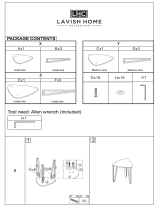
9 IMPORTANT SAFETY INSTRUCTIONS
READ AND SAVE THESE INSTRUCTIONS
6
Gas Safety
To prevent carbon monoxide build-up, do not block
appliance air vents.
Have the installer show you where the gas shut-off valve
is located.
For proper burner performance, keep igniters clean and
dry.
If a burner goes out and gas escapes, open windows
and doors. Wait until gas dissipates before using the
appliance.
WARNING
All igniters spark when any single burner is turned on. Do
not touch any of the burners when the cooktop is in use.
If you smell gas, your installer has not done a proper job
of checking for leaks. If the connections are not perfectly
tight, you can have a small leak and, therefore, a faint
smell. If you smell gas, immediately shut off the unit and
contact an authorized service technician to diagnose the
issue. See Warning, ~ "Gas Appliance Safety"
on page 4
WARNING
To prevent flare-ups all grates must be properly
positioned on the cooktop whenever the cooktop is in
use. Each of the feet must be placed into the
corresponding dimples in the cooktop. Do not use a
grate if the rubber feet are missing or damaged.
Keep the igniter ports clean for proper lighting
performance of the burners. It is necessary to clean
these when there is a boilover or when the burner does
not light even though the electronic igniters click.
WARNING
To prevent flare-ups do not use the cooktop without all
burner caps and all burner grates properly positioned.
WARNING
Do not clean or touch any of the burners when an extra
low burner (if equipped) is in use. When the extra low
burner automatically reignites the ignitor at the burner will
spark.
WARNING
Use this appliance only for its intended use as described
in this manual. NEVER use this appliance as a space
heater to heat or warm the room. Doing so may result in
carbon monoxide poisoning and overheating the
appliance. Never use the appliance for storage.
Burn Prevention
DO NOT TOUCH SURFACE UNITS OR AREAS NEAR
UNITS - Surface units may be hot even though they are
dark in color. Areas near surface units may become hot
enough to cause burns. During and after use, do not
touch, or let clothing, potholders, or other flammable
materials contact surface units or areas near units until
they have had sufficient time to cool. Among these areas
are the cooktop and areas facing the cooktop.
Do not heat or warm unopened food containers. Build-up
of pressure may cause the container to burst and cause
injury.
Always turn hood ON when cooking at high heat or when
flambéing food (i.e. Crêpes Suzette, Cherries Jubilee,
Peppercorn Beef Flambe).
Use high heat settings on the cooktop only when
necessary. To avoid bubbling and splattering, heat oil
slowly, on no more than a low-medium setting. Hot oil is
capable of causing extreme burns and injury.
Never move a pan of hot oil, especially a deep fat fryer.
Wait until it is cool.
Secure all loose garments, etc., before beginning. Tie
long hair so that it does not hang loose, and do not wear
loose-fitting clothing or hanging garments, such as ties,
scarves, jewelry, or dangling sleeves.
Child Safety
When children become old enough to use the appliance,
it is the responsibility of the parents or legal guardians to
ensure that they are instructed in safe practices by
qualified persons.
Do not allow anyone to climb, stand, lean, sit, or hang on
any part of an appliance, especially a door, warming
drawer, or storage drawer. This can damage the
appliance, and the unit may tip over, potentially causing
severe injury.
Do not allow children to use this appliance unless closely
supervised by an adult. Children and pets should not be
left alone or unattended in the area where the appliance
is in use. They should never be allowed to play in its
vicinity, whether or not the appliance is in use.
CAUTION
Items of interest to children should not be stored in an
appliance, in cabinets above an appliance or on the
backsplash. Children climbing on an appliance to reach
items could be seriously injured.
Cleaning Safety
IMPORTANT SAFETY NOTICE: The California Safe
Drinking Water and Toxic Enforcement Act requires the
Governor of California to publish a list of substances
known to the state to cause cancer, birth defects or other
reproductive harm, and requires businesses to warn
customers of potential exposure to such substances. The
burning of gas cooking fuel and the elimination of soil
during self-cleaning can generate some by-products




















